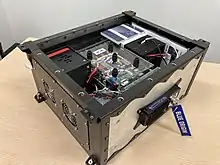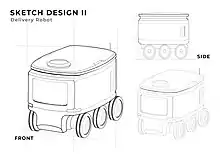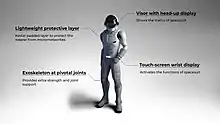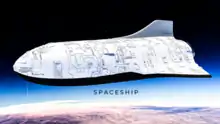Mu Space
mu Space and Advanced Technology Co., Ltd., operating under the name mu Space Corp, is a Thailand-based company that provides satellite broadband and mobile connectivity services.[1] The company was founded by James Yenbamroong in 2017 in Bangkok, Thailand, with the goal to research and develop space technology and applications for use in urban and rural areas.[1][5]
Native name | บริษัท มิว สเปซ แอนด์ แอดวานซ์ เทคโนโลยี จำกัด |
|---|---|
| Type | Private |
| Industry | Aerospace |
| Founded | June 21, 2017[1] |
| Founder | James Yenbamroong[1] |
| Headquarters | Bangkok, Thailand 13.7780794°N 100.5433054°E |
| Services | |
Number of employees | 30[5] |
| Website | www |
Initially focused on the implementation of a nationwide broadband project using satellite technology,[1] Mu Space began conducting space-related research in 2018. In July 2018, the company sent micro-gravity experiments into space aboard the Blue Origin New Shepard rocket,[6] and in September 2018 released a 3D rendering of their own spacesuit version for use by astronauts and space tourists.[4] In April 2019, mu Space submitted a proposal to the NASA Human Lander System contract.[7]
The company has signed satellite launch contracts with Blue Origin, using the New Glenn rocket,[5] and with Relativity Space using Terran 1, the world's first 3D-printed rocket.[8]
History
mu Space founder James Yenbamroong had been interested in space from an early age. He studied aerospace and mechanical engineering degrees at University of California, Los Angeles, and learned about satellite systems while working with Northrop Grumman on unmanned vehicle systems. Yenbamroong then went back to Thailand after years of living in the US and founded mu Space in June 2017. The company is based in Bangkok and had 30 staff.[1][9]
The company started with a registered capital of US$3 million.[10] In December 2017, Thailand's National Broadcasting and Telecommunications Commission granted mu Space a 15-year license to provide satellite services in the country.[11]
Technology projects
Satellite
The National Broadcasting and Telecommunications Communication had awarded mu Space a license to provide satellite services to Thailand until 2032.[11] In October 2017, the company signed a contract to lease a satellite ground system or teleport from CAT Telecom.[12] Mu Space is temporarily using the satellites of another company SES[13] to provide broadband services in Thailand, pending the development of the company's own satellite in 2021.[11]
mu Space's satellite will be worth up to US$150 million and have an orbital lifespan of up to 15 years.[14] It will use the 50.5 degree East orbital slot to provide coverage over Cambodia, Laos, Malaysia, Myanmar, Vietnam and Thailand.[15] Mu Space has signed satellite launch contracts with Blue Origin [5] and Relativity Space, to fly on the New Glenn and the 3-D printed Terran 1 rockets, respectively.[8]
Smart City
mu Space has partnered with tech company Qualcomm to deploy smart city applications and services in Thailand.[2]
In Thailand, smart city is part of the government's Thailand 4.0 initiative. The first pilot project on smart city was initiated in Phuket in 2016, where the public sector allocated US$11 million to develop the city's digital economy and transform it into an international tourism hub.[16] This was followed by Chiang Mai with an initial US$1 million fund to implement smart agriculture, and Khon Kaen with over US$400,000 to focus on becoming a medical, transportation and exhibition hub.[17]
Internet of Things (IoT)

mu Space has started developing a smart apparel that can be worn and record health data for use in medical diagnosis. Product tests will be carried out at the IoT Institute in Thailand Digital Park, scheduled to be completed in 2020.[3] Mu Space is also operating a lab at True Digital Park in Bangkok, Thailand to research and showcase their products to the public.[9][18]
Space projects
Space Payload Launch

As a part of the company's space program, in July 2018, mu Space sent an experimental payload into space aboard Blue Origin's New Shepherd space rocket to test how materials react in micro-gravity environment. The payload included a silicon bleeding-prevention device used in hospitals, a carbon nanotube, and a vacuum-sealed food product. mu Space had four times successfully sent payload to the boundary of space with the intention of raising public awareness, in the micro-gravity stages with Blue Origin New Shepard flight. In the mid 2020, mu Space will send an extra enormous payload cooperating with TOT Public Company Limited which incorporates a wide scope of electronic devices, and sensors for the estimation. Apart from that, mu Space also coordinates with a group of scientists, biologists, young students and famous Thai artists to send anti-disciplinary experiments for studying the effect of weightlessness and understanding of DNA Storage Preservation.
Autonomous Robots

Recently mu Space focuses on enhancing new innovations such as robots for small unmanned ground vehicles which are under the process of prototyping models. Artificial Intelligence (AI) and Machine Learning (ML) systems to benefit the automation systems in massive data consumption from unlimited sources, easy spam detection, simplifies time-intensive documentation in data entry as well as rapid analysis prediction and processing to enrich navigation systems. After the AI and ML systems are enhanced and completed, they will be used to build a small autonomous space vehicle regarding the future mission of Lunar exploration.
Space Tourism

In 2021, the company plans to offer space tourism service to customers in Asia-Pacific. mu Space in September 2018 revealed the 3D image of spacesuit their customers will be wearing during spaceflight.[19]
Spaceship

In September 2020, mu Space unveiled Thailand’s first development plan of a small space vehicle, following the press conference. This plan focuses on several important goals:
1) Aiming to build a Data Center outside the Earth’s atmosphere, this will eliminate the major problems of creating a data center infrastructure such as controlling the temperature to be more stable and appropriate for operational systems, which temperature must be low. This will be used up to 40% of total electricity (Research of Power Consumption by Subsystems), bringing the data center out to a cooler environment of -270 ° C., and making it possible for eliminating the obstacles of temperature.
2) This will be the utilizing of pure energy without relying on the world energy resources and this spaceship will orbit into space, including be able to receive solar energy underside of the spacecraft all the time. Moreover, it can work independently without having to lean on the resources on earth. This causes the next consequence.
3) Safety due to the spaceships orbiting in the sky and are connected in a network or constellation, making it secure from natural disasters and accidents on Earth caused by fires and floods, as well as connecting in large groups covering the entire world. This will make the connection smooth and be accessible to every corner of the world.
Collaborations
.jpg.webp)
Tham Luang cave rescue
mu Space assembled a team of engineers to help in the rescue mission to save the 12 boys and their football coach trapped inside Tham Luang cave in Thailand. The company collaborated with Google and Weather Decision Technologies to provide the rescuers with weather forecast models.[20]
The Boring Company founder Elon Musk also offered his help and discussed his rescue plan via Twitter with Mu Space founder James Yenbamroong.[21] Musk then flew to Thailand with his private jet to deliver the "kid-sized" submarines his engineers developed for the rescue mission.[22] Thai authorities however decided not to use the submarines.[23]
See also
- CAT Telecom
- True Corporation
- SES S.A.
- Blue Origin
- Homonys : Mu Aerospace
References
- "Interview: mu Space Corp | SpaceTech Asia". SpaceTech Asia. 2017-10-09. Retrieved 2018-11-21.
- "Mu Space joins Qualcomm Smart Cities Accelerator Programme". www.telecompaper.com. Retrieved 2019-06-20.
- "Mu Space sticks to IoT support plans". Bangkok Post. 2018-08-24. Retrieved 2018-11-22.
- D, Dave (2018-09-21). "mu Space unveils its futuristic and sleek spacesuit - PattayaOne". PattayaOne. Retrieved 2018-11-21.
- "Mu Space Corp signs on as 3rd customer for Blue Origin's New Glenn - The Enterprise Orbit". The Enterprise Orbit. 2017-09-27. Retrieved 2018-11-21.
- "Blue Origin successfully tests escape system in latest New Shepard launch - SpaceNews.com". SpaceNews.com. 2018-07-18. Retrieved 2018-11-21.
- "Thailand News: mu Space bids for NASA space project". news.thaivisa.com. Retrieved 2019-04-25.
- Howell, Elizabeth. "A 3D-Printed Rocket Will Launch A Thai Satellite Into Space". Forbes. Retrieved 2019-04-25.
- "Thai company First in Asia to Launch Payload Aboard US Rocket". Khaosod English. 2018-07-26. Retrieved 2018-11-21.
- "Thai space technology mu Space to raise more than US$9.2 million in 2018 - Reuters". Retrieved 2018-11-21.
- "Mu space becomes first Thai private company to acquire satellite license - The Myanmar Times". Retrieved 2018-11-21.
- "talk Satellite". www.talksatellite.com. Retrieved 2018-11-21.
- "mu Space, SES and Hughes to provide broadband access to rural Thailand - Capacity Media". www.capacitymedia.com. Retrieved 2018-11-21.
- "mu Space seeks builder for satellite bound for leased orbit - SpaceNews.com". SpaceNews.com. 2018-06-27. Retrieved 2018-11-22.
- "mu Space secures satellite spectrum rights over 6 ASEAN countries | Startup Thailand". Startup Thailand. 2018-07-01. Retrieved 2018-11-21.
- "Thailand's smart cities to herald in Thailand 4.0". The ASEAN Post. Retrieved 2019-06-20.
- "Will there be 100 smart cities in Thailand by 2038? - Asia IoT Business Platform". iotbusiness-platform.com. Retrieved 2019-06-20.
- "True Digital Park partners with mu Space, Thailand's first space technology private company, « Thai Trade Center, USA". www.thaitradeusa.com. Retrieved 2018-11-22.
- "Thailand's mu Space unveils Iron Man spacesuit design, to develop terrestrial IoT apparel | SpaceTech Asia". SpaceTech Asia. 2018-09-21. Retrieved 2018-11-22.
- "Perspective: mu Space—The Wild Boars are finally going home..." www.satmagazine.com. Retrieved 2018-11-22.
- Jordan, Dearbail (2018-07-06). "Elon Musk offers to help Thai cave rescue". BBC News. Retrieved 2018-11-22.
- "10 facts you may not know yet about Elon Musk | Startup Thailand". Startup Thailand. 2018-07-19. Retrieved 2018-11-22.
- "Elon Musk waded into Thai cave to drop off tiny rescue submarine, rescuers said no thanks". ABC News. 2018-07-10. Retrieved 2018-11-22.
